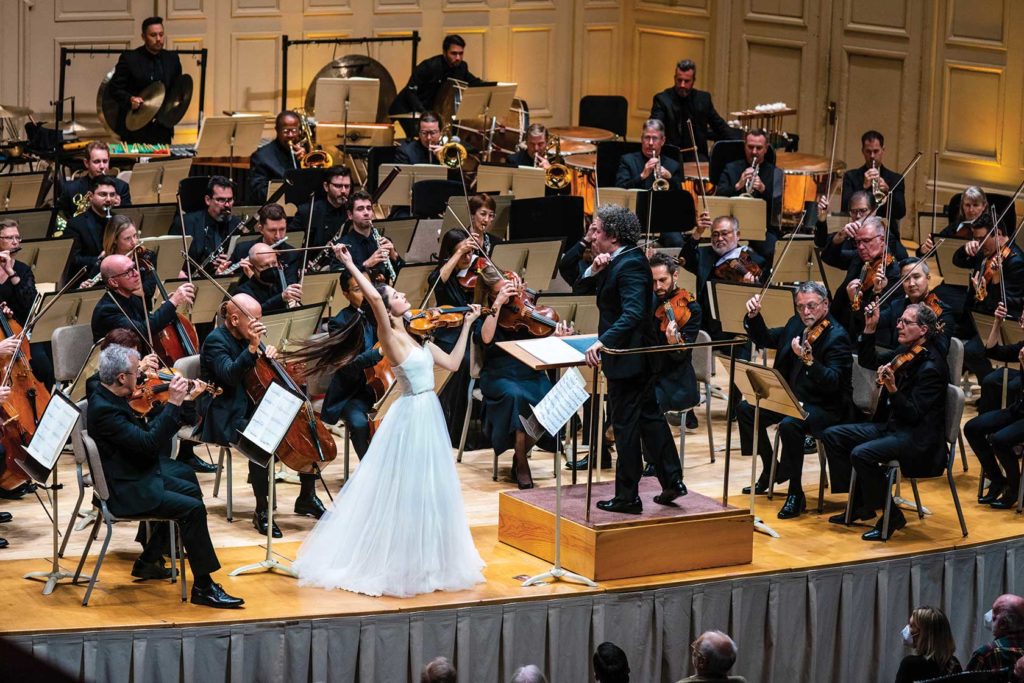A powerful performance by Los Angeles Philharmonic
Gustavo Dudamel conducts dynamic program spanning cultures, class

At Symphony Hall on Sunday, Oct. 23, the Celebrity Series of Boston presented the Los Angeles Philharmonic, conducted by its music and artistic director, Gustavo Dudamel. The concert demonstrated the power of classical music to connect people across cultures, classes and eras.
From his start at age 8 learning the violin as a member of El Sistema, Venezuela’s classical-music program for disadvantaged youth, Dudamel has seen firsthand that music can transform lives, including his own.
Under his leadership since 2009, the LA Phil has pioneered programming on stage and in neighborhoods throughout Los Angeles that reflects and engages diverse communities. These programs include its El Sistema-inspired Youth Orchestra Los Angeles, which provides free instruments, music instruction and leadership training to 1,500 students from underserved neighborhoods.
Before his Symphony Hall performance, Dudamel visited New England Conservatory to attend and coach a performance by 35 young musicians from Boston Bridge to Equity and Achievement in Music (BEAM), Boston String Academy and other youth groups. The Boston BEAM program is directed by fellow El Sistema participant Rodrigo Guerrero.
At Symphony Hall, Dudamel and the LA Phil performed two works, each rich in diverse cultural and geographic influences.
The concert began with the Boston premiere of “Altar de cuerda” (Altar of string), a 2021 concerto by Mexican composer Gabriela Ortiz, commissioned by the LA Phil. The piece is the seventh in Ortiz’ series of “musical altars,” sonic poems evoking places and scenes rich in spirit. Ortiz wrote the work, at Dudamel’s suggestion, for distinguished violinist María Dueñas, 19, a native of Granada, Spain.
With her long black hair and white gown, Dueñas was riveting to watch and listen to. Moving deftly between percussive segments and complex, lyrical passages, she sustained a dialogue with the orchestra, which often played in unison as if with a single voice.
All the while, a joyful Dudamel embodied the music, conducting with a gyrating torso, soaring arms and pulsing fingertips.
Intimate exchanges also gave pleasure, such as the interplays between Dueñas and Emmanuel Ceysson on his bright red harp, who matched her lyricism with staccato snaps and clicks as well as shimmering ripples. A musical travelogue across time, the concerto’s three movements included “Morisco chilango” (its title the composer’s nod to a chilango, a resident of Mexico City like herself, and the violinist’s Andalusian roots). Another, “Canto abierto” (open song), evoking Mexico’s 16th-century outdoor chapels that drew indigenous neighbors wary of churches, concluded with a current of shimmering bells.
After multiple standing ovations for her virtuoso Boston debut, Dueñas thanked the audience with an exquisite solo rendering of “Recuerdos de la Alhambra,” by Francisco Tárrega (1852–1909), a work celebrating the Alhambra, the 14th-century Islamic palace in her birthplace, Granada.
Also on the evening’s program was “Symphony No. 1 in D major” by Gustav Mahler (1860–1911), a work that Mahler began writing at age 24. Mingling stormy passages with serene music evoking a pastoral landscape, Mahler also wove into his first symphony a melodic riff from the folk dances of his Jewish childhood.
After another wave of standing ovations, Dudamel and his orchestra performed a high-spirited, Latin-American take on an 1858 work by Johann Strauss, “Tritsch-Tratsch Polka.” The exuberant encore was arranged by Venezuelan cellist and composer Paul Desenne, a Watertown resident who will take part in a Nov. 12 Celebrity Series Neighborhood Arts program, “Solos Together.”








